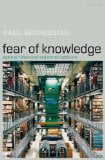 Fear of Knowledge: Against Relativism and Constructivism
Fear of Knowledge: Against Relativism and Constructivism
by Paul Boghossian
Oxford University Press, £14.99 (hb), ISBN 0-19-928718-X
The glorious Sokal booby-trap of 1996 seems to have done sadly little to lessen the attraction and durability of that intellectual plague known variously as relativism, constructivism or constructionism. The view that there is no such thing as objective reality, that truth is only relative to a society, conceptual framework or even personal perspective, is entrenched in a range of “disciplines” (if they still merit the term) taught at colleges worldwide, from sociology, psychology and history to music and media studies.
The laborious, intricate, principled, collective effort to find out how the world is, known as science, enjoys no support from fellow academics in thrall to a fashionable ideology that sees the theories and findings of science as merely socially-constructed texts devoid of literal reference to causal processes in a material world. How many thousands of graduates per year promote and apply this approach in their work and social interactions?
Mainstream Anglophone philosophy departments have not, reports Boghossian, Professor of Philosphy at New York University, succumbed to the exotic charms of postmodernism, and this concise book neatly explores the deep flaws in the view that facts are only social constructs, or that theory choice in science is caused by social factors rather than by empirical evidence. Boghossian analyses the work of historian Thomas Kuhn, philosopher Richard Rorty and sociologist David Bloor, among others, concluding that, “on the negative side, there look to be severe objections to each and every version of a constructivism about knowledge that we have examined. A constructivism about truth is incoherent. A constructivism about justification is scarcely any better. And there seem to be decisive objections to the idea that we cannot explain belief through epistemic reasons alone. On the positive side, we failed to find any good arguments for constructivist views.”
The taste for supernatural fancies often draws support from theories undermining appeals to factual evidence. This book is another contribution to the defence of the view, underpinning science, that there is a way the world is, independent of human opinion.
Paul Taylor

